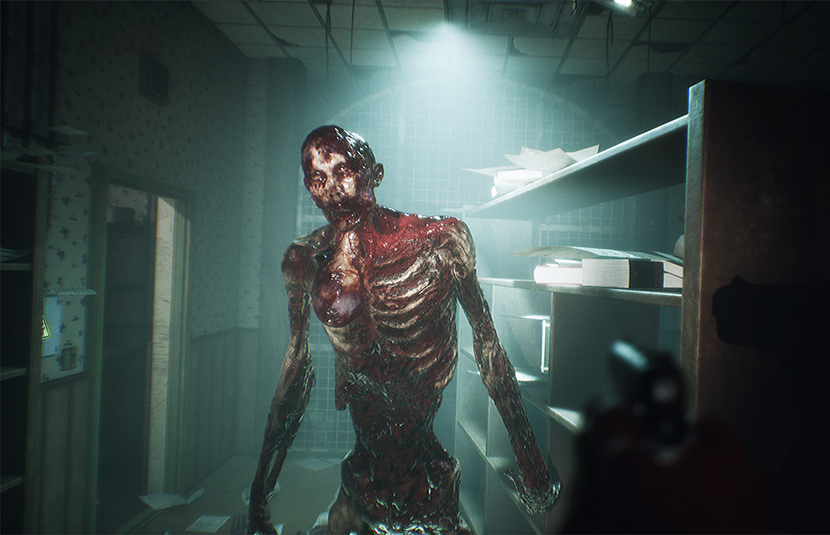I’ve been drawn into a couple of conversations over the last year or so, usually against my will, about the use of excessive signposting in video games. Recent releases like Final Fantasy VII Rebirth, the Separate Ways DLC for the Resident Evil 4 remake, and Still Wakes the Deep have slathered their environments in yellow paint in order to label their critical paths. Some people find that to be an insult to their intelligence. Some people are apparently desperate to get insulted.
Conversely, if you’re looking for what a game looks like with no signposting at all, check out Pneumata. It is actively uninterested in telling you where to go or occasionally what you should do, to the point where I managed to sequence-break it several times without trying. It’s a messy first draft of a game, with atmosphere and gore to spare, but it needed a lot more testing before release.
Pneumata, by solo developer Antonio Alvarado, is a first-person survival horror game that takes its inspirations from Resident Evil, Outlast, and Condemned: Criminal Origins. It’s a pure grindhouse experience, straight out of Brian Yuzna’s dream journal, set in a small town that’s been overtaken by an unknown contaminant.
You play Pneumata as David Hernandez, a private detective who’s searching for his missing wife Jamie. David’s investigation has hit a dead end, but then someone leaves a videotape on his doorstep that points him towards Milton, Missouri.
When David reaches Milton, he discovers most of the town is abandoned. Its church is the site of a recent massacre, the roads are choked with wrecked cars, and every survivor he finds is a hostile freak in a pig mask, heavily mutated, or both. David has to fight his way back out of town, while also searching for clues about Jamie.
The horror of Pneumata is that of being lost and desperate. It’s a game that loves to back you into a corner, with sudden appearances by small groups of fast-moving monsters or hallways lined with explosive blisters. Every environment you enter is bloodstained, decayed, or half-destroyed. It’s one of those games that makes it very easy to imagine how it must smell, full of rotting trash, old gore, and torn corpses.
David has a handgun and shotgun, and can find a submachinegun, but you do a lot of work in Pneumata in melee range. You can wield bats, pipes, broken bottles, or a fire axe; block incoming swings; and throw a good stiff kick to knock enemies off-balance.
Most of those enemies are mutated humans, covered in caustic boils and with their skin falling off in sheets. There’s an odd push-pull at work where a lot of enemies explode when struck in the right place, so you can’t simply run up and bash their heads in. You’ll often want to shoot their boils/tumors off, then go to work with your pipe. On top of that, you’ll have to deal with the occasional biological land mine, like a cluster of toxic grapes clinging to a wall, or a cat-sized spider that crawls up to you in utter silence.
Pneumata is designed to be a classically-styled survival horror game with an emphasis on melee, and for its first couple of levels, it just about pulls it off. There’s a real sense of claustrophobia to its environments, many of which are normal buildings that have been turned into mazes by barricades, traps, and recent damage. Pneumata is actively trying to get you lost, and wants you to feel paranoid in the process. For a horror game, its lack of signposting is a weird sort of asset.
That being said, Pneumata gets messier the further you get into it, to the point where I’d argue it simply shouldn’t have been released in this state. I’ve never hit a truly show-stopping bug, but the game is constantly breaking in small ways, and it adds up.
In my run, the biggest offender was the enemy AI, which frequently loses track of its pathing and often didn’t reset individual zombies’ positions or awareness when I loaded a save. It also seemed cheerfully unaware that Pneumata is supposed to have stealth mechanics, as enemies were able to track my position from a hundred yards whether I was making sound or not.
Despite that, I had some fun with roughly the first two-thirds of Pneumata. Of all the games Alvarado’s mentioned, it comes closer to Condemned than anything else, with its masked maniacs and improvised clubs. It could use a few balance passes in addition to bug fixes, such as improved enemy hit/hurtboxes or a second look at your melee arsenal (why is the spiked bat so fragile?), but for an indie one-man show, I thought it was all right.
Then I hit the last third of the game, which wrecked much of my goodwill. The last couple of hours of Pneumata are an absolute slog, full of artificial difficulty and petty frustrations. The final level in particular is terrible, with one of the most obnoxious bosses in horror history. I would be amazed to learn that it had been play-tested at all.
Pneumata started with a learning curve, as its combat has its own unique flow and its lack of signposting and maps provided a unique challenge. Once I got used to it, Pneumata became a tense, occasionally brutal experience, made more complicated by a few critical systems refusing to work as intended.
I was initially inclined to cut Pneumata a lot of slack, as a debut project from a solo developer, but then I played its endgame. I don’t know if Alvarado simply ran out of time and had to release it with what he had, but in its current state, Pneumata is only worth a look for absolute die-hard survival horror fanatics. It’s got some potential, but I can’t honestly recommend it.
Pneumata is out now on PC via Steam, PlayStation 5 and Xbox Series.


